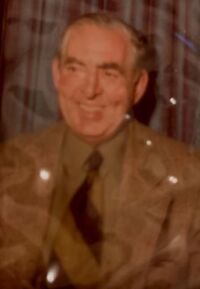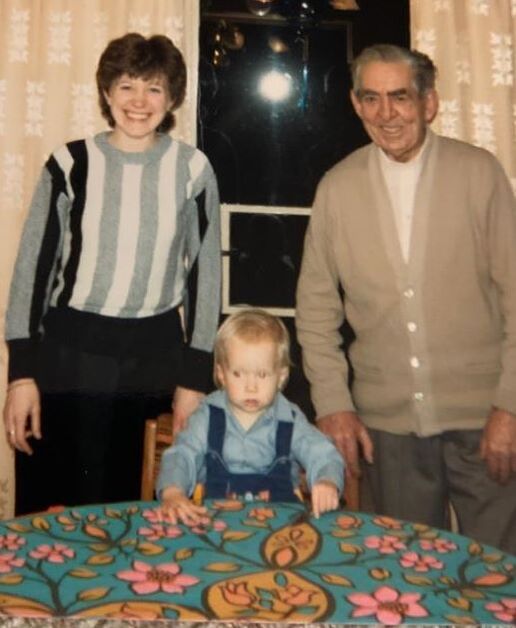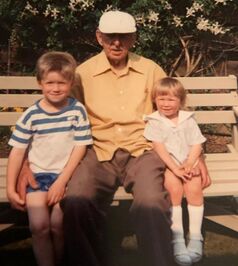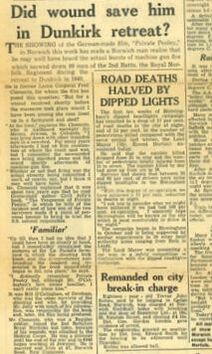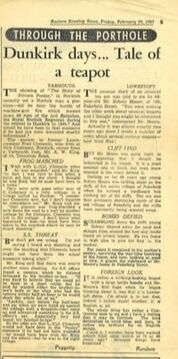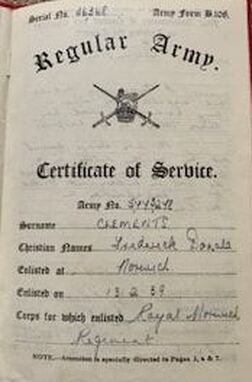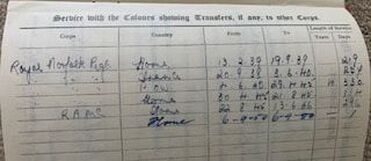Lance Corporal Fred Clements
Lance Corporal Fred D. Clements was fighting in the area around Le Paradis in May, 1940, and may have heard the machine gun fire that killed so many in the massacre.
After the war, Fred told local newspapers that he might have been in the massacre had he not been shot in the chest. He remembered the village of Le Paradis and also one of the two survivors of the massacre.
"I distinctly remembered Private Pooley and, although Mr O' Callaghan's face seems familiar, I can't really place him," Fred told the newspapers after reading the book The Vengeance of Private Pooley" by Cyril Jolly.
Fred says that he was with other wounded men in a cowshed and recognised the farmyard where the massacre took place from photographs in the Jolly book.
Fred Clements was born in Norwich on June 1st, 1919. He married Joan Mary Owen and had one son - Ian - who was born on December 14th, 1957. Fred enlisted in the Royal Norfolk Regiment on February 13th, 1939, and was serving in Northern France at the time of the Le Paradis Massacre. His service number was 5773278.
Fred was taken prisoner on June 4th, 1940, and spent the next four years and 330 days in the infamous Colditz Castle.
Fred's son Ian told us that his father never said much about the war but a number of year's ago the pair were watching the television series Colditz. His father immediately turned the TV off as he didn't want to see it - obviously it brought back too many bad memories.
Remarkably Fred carried a live bullet in his body from the war for the rest of his life. He was told that to remove it could present a risk to him. On his death the funeral director wanted to know whether Fred had a pacemaker or similar in his body as this could be detrimental to the cremators. You can imagine the funeral director's expression when he was told about the bullet!
Fred's grandson Christopher sent us the following memories:
"Fred Clements - Our Grandad - Grandad Passed away when I was 14-years-old but 22 years on I still have fantastic memories of him and the type of person he was. Perfection is a word I would use to describe his beliefs whether that be the three beautifully kept gardens, the perfect buffet style dinner that we always had on a Saturday where I discovered the art of mixing salad cream and tomato sauce or creating monster sandwiches. As I write this now I can see myself slicing the radishes up into thin slices and laying them on top of the fillings that I had placed within this sandwich. Cottage cheese and celery on the side, oh this is making me hungry. Angel delight for desert.
"Enough about food. Grandad loved his Grandchildren very much. Myself and my sister Michelle loved visiting. It was a relaxed environment and I was allowed to play bowls in the hallway trying to make the bowls curl in a small area with the blue spot always on the right but if I hit the wall or the front door there would always be a "Christopher". But I knew that was all that had to be said.
"Grandad loved various sports and would play various games with us. Funnily enough I have just thought of the football results being read out on the telly whilst dinner was being prepared.
"The Christmas party trick which he carried out with perfection was licking the tips of his thumb and finger and putting the candle flame out after Christmas Dinner.
"I have many fond memories and the cartoon portrait I have hanging on my living room wall is a visual reminder of him. Grandad served his country and served his family for which I salute him. Love and life-long memories I will always treasure.
Christopher and Michelle Clements x
Below are documents and photographs from the Clements Family which are reproduced with their permission. The cartoon at the top of this page is one of his grandson Christopher's prized possessions. There are also newspaper cuttings from the Eastern Evening News with comments about the massacre by Fred. You can read the cuttings in their pdf version at the bottom of the page. The cuttings are from January 14th and February 22nd, 1963.
After the war, Fred told local newspapers that he might have been in the massacre had he not been shot in the chest. He remembered the village of Le Paradis and also one of the two survivors of the massacre.
"I distinctly remembered Private Pooley and, although Mr O' Callaghan's face seems familiar, I can't really place him," Fred told the newspapers after reading the book The Vengeance of Private Pooley" by Cyril Jolly.
Fred says that he was with other wounded men in a cowshed and recognised the farmyard where the massacre took place from photographs in the Jolly book.
Fred Clements was born in Norwich on June 1st, 1919. He married Joan Mary Owen and had one son - Ian - who was born on December 14th, 1957. Fred enlisted in the Royal Norfolk Regiment on February 13th, 1939, and was serving in Northern France at the time of the Le Paradis Massacre. His service number was 5773278.
Fred was taken prisoner on June 4th, 1940, and spent the next four years and 330 days in the infamous Colditz Castle.
Fred's son Ian told us that his father never said much about the war but a number of year's ago the pair were watching the television series Colditz. His father immediately turned the TV off as he didn't want to see it - obviously it brought back too many bad memories.
Remarkably Fred carried a live bullet in his body from the war for the rest of his life. He was told that to remove it could present a risk to him. On his death the funeral director wanted to know whether Fred had a pacemaker or similar in his body as this could be detrimental to the cremators. You can imagine the funeral director's expression when he was told about the bullet!
Fred's grandson Christopher sent us the following memories:
"Fred Clements - Our Grandad - Grandad Passed away when I was 14-years-old but 22 years on I still have fantastic memories of him and the type of person he was. Perfection is a word I would use to describe his beliefs whether that be the three beautifully kept gardens, the perfect buffet style dinner that we always had on a Saturday where I discovered the art of mixing salad cream and tomato sauce or creating monster sandwiches. As I write this now I can see myself slicing the radishes up into thin slices and laying them on top of the fillings that I had placed within this sandwich. Cottage cheese and celery on the side, oh this is making me hungry. Angel delight for desert.
"Enough about food. Grandad loved his Grandchildren very much. Myself and my sister Michelle loved visiting. It was a relaxed environment and I was allowed to play bowls in the hallway trying to make the bowls curl in a small area with the blue spot always on the right but if I hit the wall or the front door there would always be a "Christopher". But I knew that was all that had to be said.
"Grandad loved various sports and would play various games with us. Funnily enough I have just thought of the football results being read out on the telly whilst dinner was being prepared.
"The Christmas party trick which he carried out with perfection was licking the tips of his thumb and finger and putting the candle flame out after Christmas Dinner.
"I have many fond memories and the cartoon portrait I have hanging on my living room wall is a visual reminder of him. Grandad served his country and served his family for which I salute him. Love and life-long memories I will always treasure.
Christopher and Michelle Clements x
Below are documents and photographs from the Clements Family which are reproduced with their permission. The cartoon at the top of this page is one of his grandson Christopher's prized possessions. There are also newspaper cuttings from the Eastern Evening News with comments about the massacre by Fred. You can read the cuttings in their pdf version at the bottom of the page. The cuttings are from January 14th and February 22nd, 1963.
|
TRANSCRIPT
L/Cpl Fred Clements (Eastern Evening News 14th January 1963). Did wound save him in Dunkirk retreat? The showing of the German-made film, “Private Pooley,” in Norwich this week has made a Norwich man realise that he may well have heard the actual bursts of machine gun fire which mowed down 99 men of the 2nd Battn. The Royal Norfolk Regiment during the retreat to Dunkirk in 1940. He is Lance Corporal Fred Clements, for whom the film has posed this question: “But for a wound received shortly before the massacre took place would I have been among the men lined up in a farmyard and shot? “At the time”, explains Mr Clements, who is wallboard manager for Messrs. Jewson, in Colegate, “I was lying down with other wounded men in a cowshed. For many years afterwards I had no firm recollection of where the exact spot was, but I remember the unwounded men being marched away and the sound shortly afterwards of machine-gun fire. “Whether or not that firing was the actual atrocity being committed I can’t, of course, say, but I think it may well have been.” Mr Clements explained that it was about two years ago that he read Gressenhall author Cyril Jolly’s book “The Vengeance of Private Pooley,” in which he tells of the incident and of how one of the two survivors made it a point of personal honour to bring to trial the S.S. Colonel responsible. ‘Familiar’ “Up until then I had no idea that I could have been so closely at hand, but I immediately recognised the pictures of the La (sic) Paradis farmyard in which the shooting took place, and the circumstances surrounding the incident and recounted in the book immediately began to fall into place” he says. “I distinctly remember Private Pooley but, although Mr O’Callaghan’s face seams familiar, I cannot really place him”. It was Bill O’Callaghan, of Dereham, who was the other survivor of the shooting and who, by providing Mr. Jolly with much of his information, was responsible for the book and, later, the film being produced. Mr Clements, who was a Regular soldier, joined the 2nd Battalion Royal Norfolks but later, because of his wounds, was attached to the Medical Corps. He was a prisoner until the end of the war and in 1946 began working at Jewsons. He is married and live at 47, Norwich Road, New Costessey. |
TRANSCRIPT
L/Cpl Fred Clements (Eastern Evening News, Friday, February 22, 1963). Dunkirk Days YARMOUTH The showing of “The Story of Private Pooley,” in Norwich recently set a Norfolk man a problem – did he hear the bursts of machine-gun fire which mowed down 99 men of the 2nd Battalion the Royal Norfolk Regiment during the retreat to Dunkirk in 1940? And would he have been in that massacre if he had not been wounded shortly beforehand? The answer to former Lance-corporal Fred Clements, who lives at new Costessey, Norwich, comes from a Yarmouth man, Mr. A. W. King, of 14 Tennyson Road. FROG- MARCHED “I was with L/Cpl Clements when he was wounded,” said Mr. King. “In fact I was next to him when a burst got him in the chest. I thought he was dead, but he must have been in a coma.” They were with some other men of C Company in a little cottage in a village called Le Paradise (sic). “I remember Clements well, but I don’t suppose he remembers me”. Mr. King told me. “Our platoon was frog-marched a mile down the road to a wall by another cottage by the Germans. Clements was left in the cottage. I don’t know what happened to him – he must have been taken to the cowshed where he says he heard the shooting.” S.S. THREAT “But don’t get me wrong. I’m not saying that I heard any shooting, and even the shooting that Clements heard might not have been the actual massacre taking place.” Mr. King said that there was nearly another mass shooting. An S.S. officer found a camera, which he claimed belonged to his brother-in-law. “It was hard to believe that we could all be dead in a short while, but he said he wanted either his brother-in-law’s body or the chap who had camera within half-an-hour or he would shoot the whole lot of us.” “Luckily, just before the half-hour was up, when we were lined up against the cottage wall, a despatch-rider came up and whispered something in the S.S. Officer’s ear. Apparently they had found his brother-in-law.” So the odds are the L/Cpl. Clements would not have been in the “Pooley” massacre if he had not been wounded – he would have been with Mr. King and the others – but he was in the right village. Peggotty |
Your browser does not support viewing this document. Click here to download the document.
Your browser does not support viewing this document. Click here to download the document.
